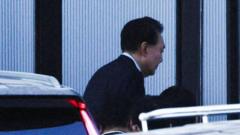South Korea's President Yoon Suk Yeol has made headlines as the first sitting leader in the country's history to be arrested, marking a significant moment amidst a period of intense political crisis. His arrest follows a prolonged standoff with investigators from the Corruption Investigation Office (CIO) as they tried to enforce a warrant tied to charges of insurrection after Yoon's controversial attempt to impose martial law, which ultimately led to his impeachment.
Despite being arrested, Yoon remains president until the constitutional court resolves the validity of his impeachment. However, during the operation to apprehend him, police resorted to using ladders and wire cutters amid freezing temperatures, as his security detail erected barricades in an attempt to obstruct the arrest. Upon his decision to appear before investigators, Yoon expressed that he was complying to prevent violence, although he labeled the investigation as unlawful.
The dramatic arrest has drawn polarized reactions from the public and political figures. Members of Yoon's People Power Party condemned the operation as "illegal," while leaders from the opposing Democratic Party hailed the event as a restoration of justice in South Korea. The political landscape continues to evolve, with Finance Minister Choi Sang-mok currently serving as acting president following the impeachment of his predecessor.
Yoon’s arrest underscores the rift within the country, highlighted by cheering supporters of the anti-Yoon faction juxtaposed with the dismay of his loyalists. This incident epitomizes the ongoing struggle between different branches of government—law enforcement determined by a warrant versus presidential security staff tasked with protecting the president.
As South Korea navigates this new chapter in governance amid legal scrutiny and public dissent, the depth of division and unrest continues to evolve, posing critical questions about stability and the future of democracy in the country.






















